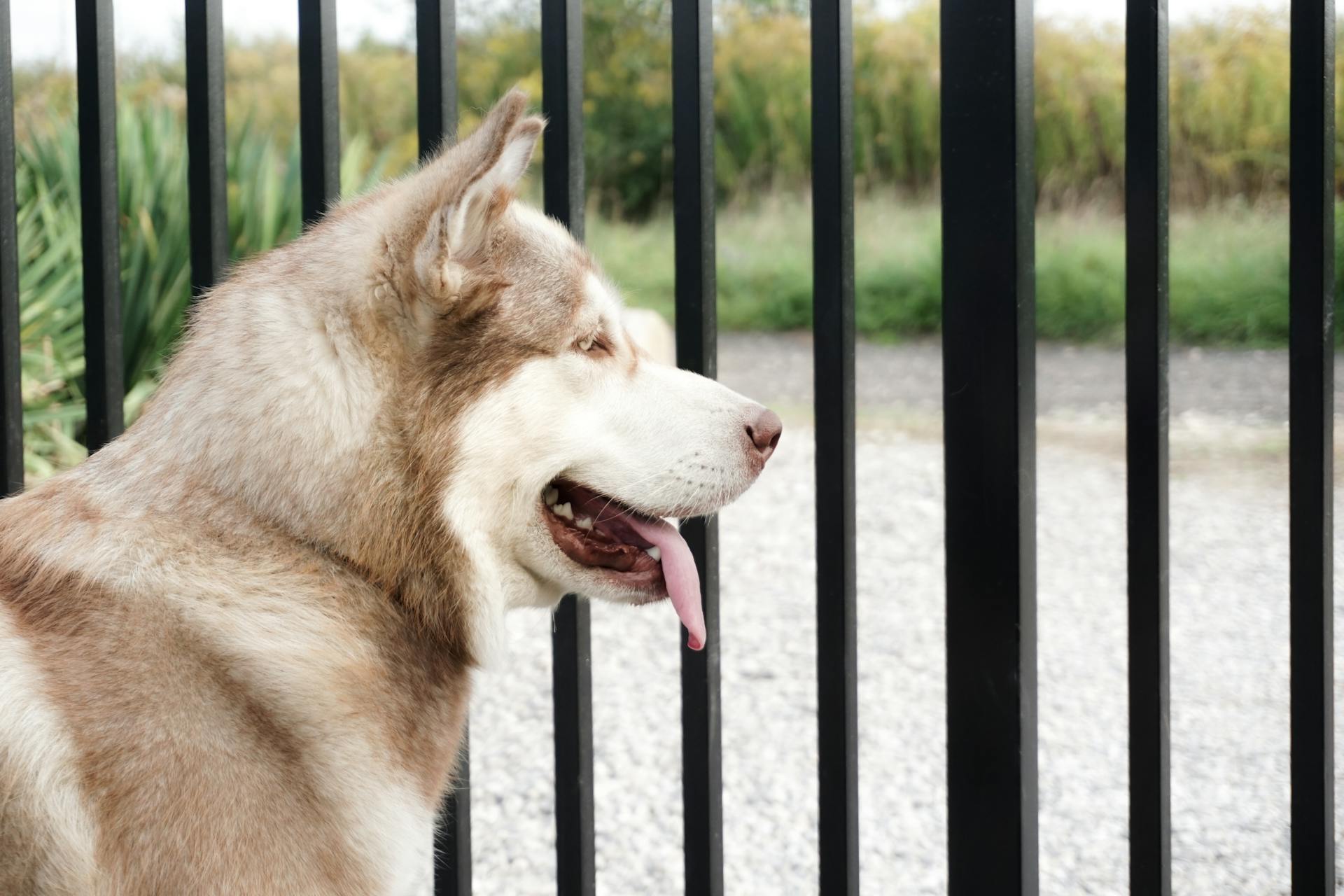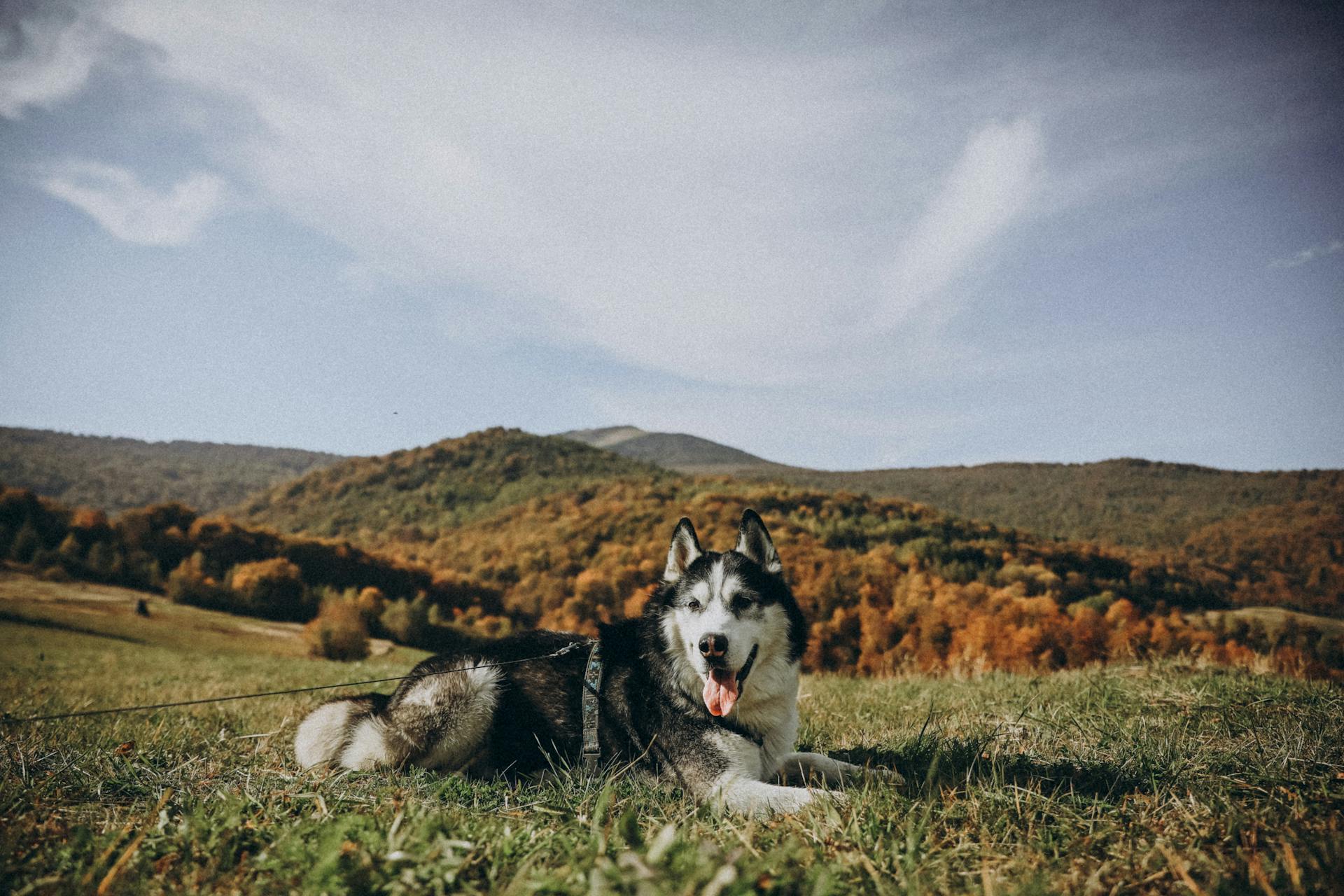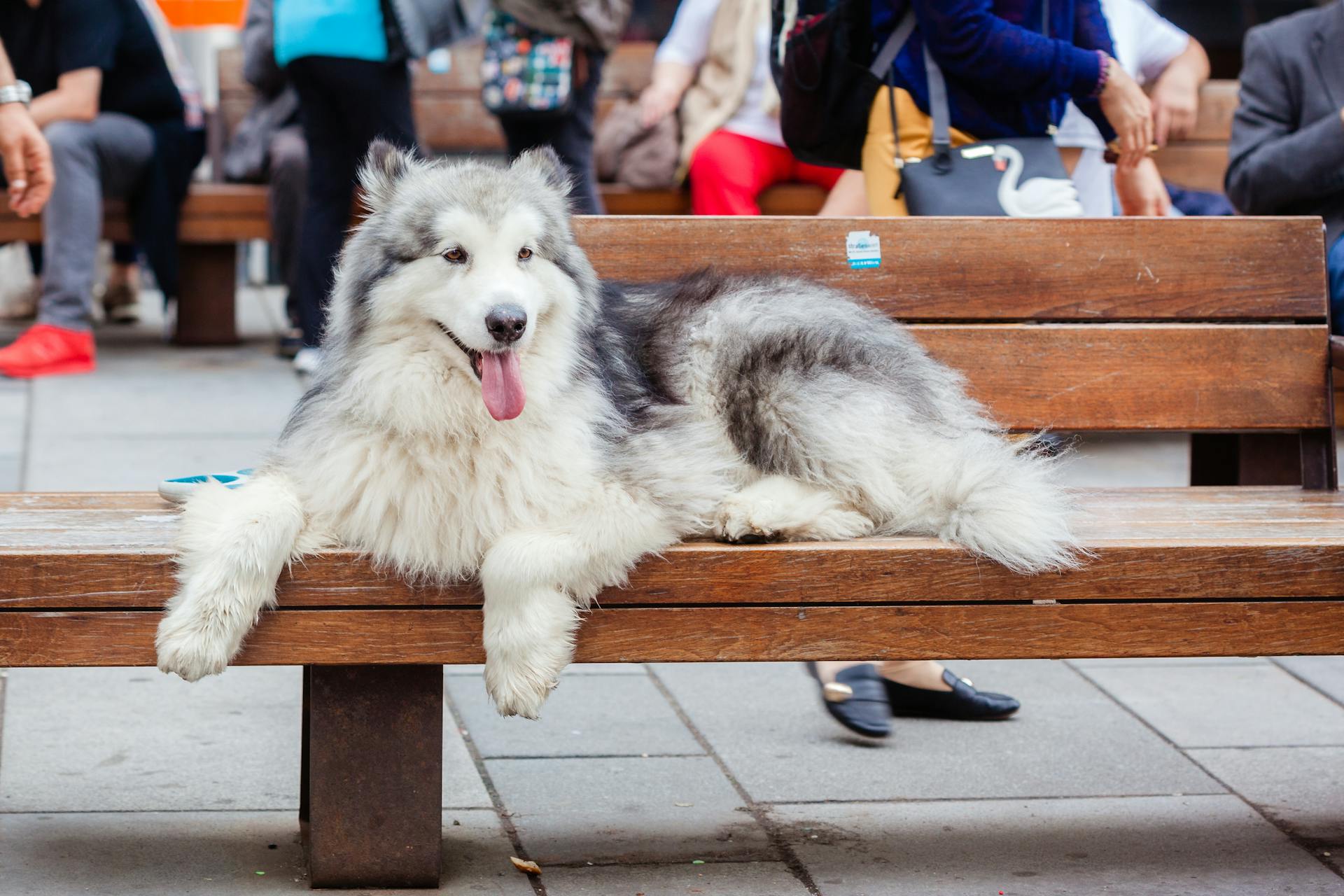
Alaskan Malamutes are a remarkable breed, known for their strength, endurance, and loyal nature.
On average, a well-cared-for Alaskan Malamute can live for around 10-14 years.
Their lifespan is influenced by various factors, including diet, exercise, and genetic predispositions.
While some Malamutes have been known to live into their late teens, 10-14 years is a more realistic expectation for most owners.
Expand your knowledge: Are Alaskan Malamutes Good Guard Dogs
General Information
Alaskan Malamutes are a relatively long-lived breed, with an average lifespan of 10-14 years.
They are a robust and healthy breed, but like all dogs, they can be prone to certain health issues.
Alaskan Malamutes are a large breed, with males weighing between 70-95 pounds and standing between 23-26 inches tall.
Their size and build make them well-suited to their original purpose as sled dogs.
Alaskan Malamutes are a social breed and thrive on interaction with their human family.
They require regular exercise and mental stimulation to prevent boredom and destructive behavior.
Worth a look: Cavalier Dog Breed Lifespan
Health Issues
Alaskan Malamutes are generally healthy dogs with a lifespan of 10-14 years. However, they can be prone to certain health issues.
Hip dysplasia is a common health concern in Alaskan Malamutes, an inherited disease that causes the hip joints to form improperly and leads to arthritis. This can lead to lameness in their hind legs and difficulty getting up from lying down.
Genetics play a significant role in determining an Alaskan Malamute's predisposition to certain health conditions, including hip dysplasia, cataracts, and chondrodysplasia. Regular screenings and preventive care can detect issues early, improving treatment outcomes and potentially extending their lifespan.
Choosing a reputable breeder who conducts genetic testing on their breeding dogs can help minimize the risk of inheriting serious health problems. This can give you peace of mind and help you make an informed decision when bringing home a new puppy.
Overweight dogs may develop arthritis years earlier than those of normal weight, causing undue pain and suffering. Maintaining a healthy weight through proper diet and exercise can help manage this condition.
Early detection through screening, weight management, and appropriate exercise can help manage hip dysplasia and improve the dog's quality of life. In some cases, surgical intervention may be necessary to improve the dog's mobility and comfort.
On a similar theme: How Much Do Alaskan Malamutes Weigh
Care and Exercise
To ensure your Alaskan Malamute lives a long and healthy life, regular care and exercise are essential. Brush her coat at least weekly, and teeth at least three times a week, as Malamutes often have serious problems with their teeth.
A proper diet and exercise routine are crucial for your Malamute's overall health. Feed a high-quality diet appropriate for her age, and keep her diet consistent. Avoid giving her people food, as this can lead to obesity and other health issues.
Exercise your dog regularly, but don't overdo it at first. Malamutes are expert diggers and climbers, so a high fence, at least 6 feet tall, is recommended. Consistent, daily exercise routines not only strengthen the bond between pet and owner but also contribute to a longer, happier life for your Malamute.
Here's a list of key care and exercise tips to keep in mind:
- Brush her coat at least weekly
- Brush her teeth at least three times a week
- Feed a high-quality diet appropriate for her age
- Exercise your dog regularly, but don't overdo it at first
- Bury your fence and keep it at least 6 feet tall
- Use dog-safe sunscreen to protect against sunburn
Attention to Joint
Alaskan Malamutes are prone to joint issues due to their size and active nature.
Maintaining a healthy weight is crucial to prevent joint problems.
Providing regular, moderate exercise is also essential for joint health.
Supplementing with joint-supportive nutrients like glucosamine and chondroitin can make a big difference.
Early intervention is key in cases of limping or stiffness to prevent further damage.
Care and Exercise
Caring for your Alaskan Malamute requires attention to their diet, exercise, and mental stimulation. Regular veterinary check-ups are essential to monitor their overall health and address any concerns.
A balanced diet is crucial for your Malamute's health, and feeding a high-quality diet appropriate for their age is a must. Consistency is key, so avoid giving them people food and stick to a regular feeding schedule.
Exercise is vital for your Malamute's physical and mental health. Regular, moderate exercise, such as hiking or interactive play, can help maintain a healthy weight and prevent joint issues like hip dysplasia.
Mental stimulation is just as important as physical exercise, and activities like training sessions, puzzle toys, and social interactions can provide the necessary stimulation to prevent boredom and destructive behaviors.
To support joint health, maintaining a healthy weight, providing regular exercise, and supplementing with joint-supportive nutrients like glucosamine and chondroitin can make a big difference.
Consider reading: Giant Alaskan Malamute Weight
Here's a list of essential care tasks to keep your Malamute happy and healthy:
- Brush their coat at least weekly
- Brush their teeth at least three times a week to prevent serious problems
- Clean their ears weekly
- Supervise them like a toddler to prevent accidents and mischief
- Exercise them regularly, but don't overdo it at first
- Provide a safe living environment, including a secure fence at least 6 feet tall
By following these care and exercise guidelines, you can help your Alaskan Malamute live a long, happy, and healthy life.
How Socialization Affects Dogs
Socialization is a crucial aspect of a dog's life, and it has a profound impact on their mental and physical health. Proper socialization from a young age helps prevent behavioral issues, such as aggression or anxiety.
Exposing your dog to various people, animals, environments, and situations in a controlled and positive manner is key to socialization. This helps enhance their adaptability and well-being.
Social dogs are generally happier, which can positively affect their overall health and potentially extend their lifespan.
On a similar theme: Malamute Health Issues
Feeding & Diet
Feeding your Alaskan Malamute a high-quality dog food with real meat like chicken, turkey, or beef listed as the first ingredient is crucial for a longer and healthier life.
A diet with high protein content is essential for this large and active breed, which will help maintain their energy levels and support their overall health.
Proper nutrition can help prevent obesity, a common problem that can lead to serious health issues in large breeds, including joint stress, diabetes, and cardiovascular diseases.
A balanced diet that provides the right balance of proteins, fats, carbohydrates, vitamins, and minerals is vital for maintaining a strong immune system.
Consulting with a veterinarian to determine the most appropriate diet plan for your Malamute is advised, as they may have different nutritional requirements than other breeds.
Monitoring your Malamute's response to their diet and making adjustments based on their health status, age, and activity level can contribute to a longer and healthier life.
Proper hydration is also crucial, as it supports digestion, nutrient absorption, and kidney function, so be sure to provide fresh water at all times.
Avoid feeding foods formulated for “working dogs” unless your pet is actually in work, as this can lead to excessive weight gain and related health issues.
Veterinary Care
Regular veterinary check-ups are crucial for early detection and management of health issues that could impact your Alaskan Malamute's lifespan. These visits allow for routine vaccinations, parasite control, and health screenings for conditions common in large breeds.
Establishing a proactive healthcare plan with your veterinarian is a must, including regular blood work and health assessments, to identify and address potential health concerns before they become serious. This can help ensure your Malamute remains healthy and vibrant throughout their life.
You should schedule annual checkups with your veterinarian to monitor your dog's overall health and discuss any concerns that you have. Your veterinarian can also help you assemble a first-aid kit for your dog, including supplies for minor injuries and illnesses.
Here are some common health issues that can affect Alaskan Malamutes:
- Hip dysplasia
- Cataracts
- Hypothyroidism
- Chondrodysplasia
- Polyneuropathy
- Day blindness, due to cone degeneration
Breed-Specific Considerations
Regular veterinary check-ups are crucial for early detection and management of health issues that could impact your Alaskan Malamute's lifespan. These visits allow for routine vaccinations, parasite control, and health screenings for conditions common in large breeds.
Being proactive with your Malamute's healthcare plan is key. Establishing a plan with your veterinarian, including regular blood work and health assessments, can help identify and address potential health concerns before they become serious.
Awareness of breed-specific health considerations is important for Alaskan Malamute owners. Conditions like hypothyroidism, cataracts, and bloat (Gastric Dilatation-Volvulus) are more prevalent in Malamutes.
Working closely with a veterinarian familiar with the breed can help you navigate these challenges effectively. This can make a big difference in your Malamute's health and longevity.
Explore further: Pug Dog Life Expectancy
Regular Veterinary Check-Ups
Regular veterinary check-ups are crucial for early detection and management of health issues that could impact your Alaskan Malamute's lifespan. These visits allow for routine vaccinations, parasite control, and health screenings for conditions common in large breeds.
You should schedule annual checkups with your veterinarian to monitor your dog's overall health and discuss any concerns that you have. Establishing a proactive healthcare plan with your veterinarian, including regular blood work and health assessments, can help identify and address potential health concerns before they become serious.
Some common health conditions that may require monitoring include hip dysplasia, cataracts, hypothyroidism, chondrodysplasia, polyneuropathy, and day blindness. These conditions can be managed with proper care and attention, but early detection is key.
It's essential to get regular dental checkups and assemble a first-aid kit for your dog, including supplies for minor injuries and illnesses. This will help ensure your Malamute stays healthy and vibrant throughout their life.
Here are some key health screenings to consider:
Regular veterinary check-ups can help identify and address potential health concerns before they become serious, ensuring your Malamute remains healthy and vibrant throughout their life.
Life Expectancy
Alaskan Malamutes typically live between 10 to 14 years.
Regular veterinary check-ups, a balanced diet, and adequate physical activity are crucial to maximizing their lifespan. Engaging in activities that fulfill their working breed instincts, such as hiking and interactive play, can improve their quality of life.
Factors like genetics, diet, exercise, and overall care can significantly impact an Alaskan Malamute's lifespan. Pets that receive proper nutrition, regular exercise, and routine veterinary care tend to live longer than those that don't.
Average Calculation
The average lifespan of an Alaskan Malamute ranges from 10 to 14 years. This is influenced by factors such as genetics, diet, exercise, and overall care.
Regular veterinary check-ups, a balanced diet, and adequate physical activity are crucial for maximizing an Alaskan Malamute's lifespan. Proper nutrition, regular exercise, and routine veterinary care tend to lead to longer lifespans.
Genetic conditions, such as hip dysplasia and hypothyroidism, can affect an Alaskan Malamute's lifespan. Managing these conditions through regular veterinary care is key to extending their life.
Dogs that receive proper care can live longer than those that don't. Some Alaskan Malamutes may reach the upper end of the lifespan range, while others might have shorter lifespans due to health issues.
Senior Stage (6+)
As your Malamute enters their senior years, they may start to show signs of aging. Reduced activity is a common symptom.
You may need to take your pet to the vet more often to monitor their health. This is especially true if you notice a faded or greying coat.
Arthritis is basically a certainty in older, large breed dogs. You should talk to your vet about starting your Malamute on joint support from this age.
Joint supplements will be of most benefit before any signs of arthritis. This can help prevent or slow down the progression of the condition.
Sources
- https://www.petmd.com/dog/breeds/alaskan-malamute
- https://www.dogbreedslist.info/all-dog-breeds/alaskan-malamute.html
- https://www.smallanimalclinic.com/services/dogs/breeds/alaskan-malamute
- https://iheartdogs.com/alaskan-malamute-lifespan-what-to-expect-how-to-help-an-alaskan-malamute-live-longer/
- https://www.hepper.com/how-long-does-an-alaskan-malamute-live/
Featured Images: pexels.com


